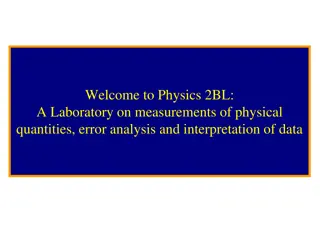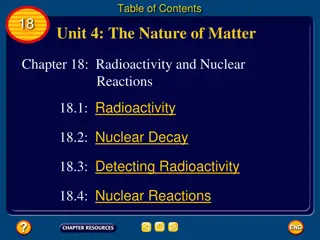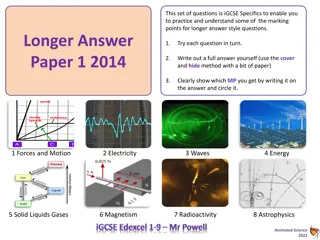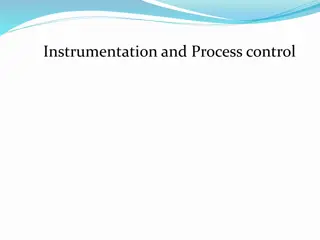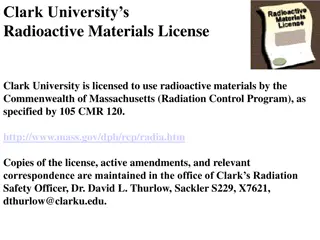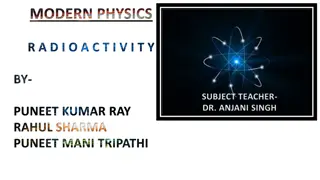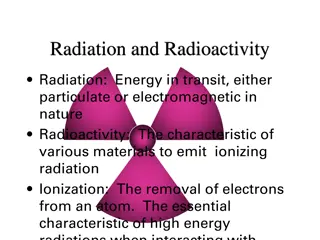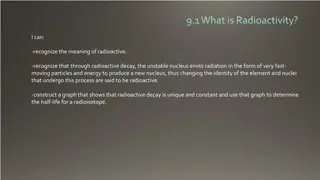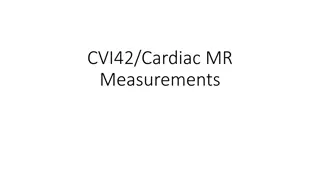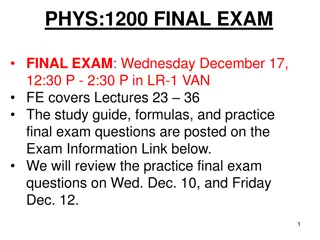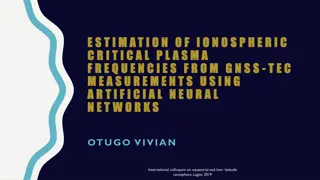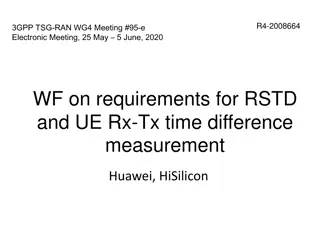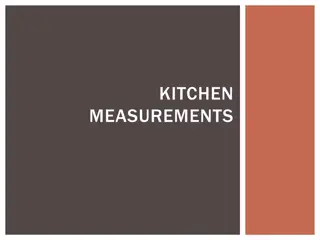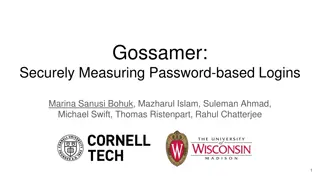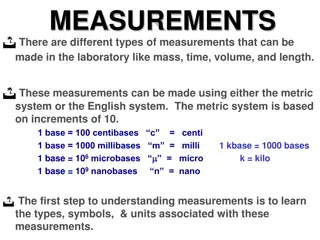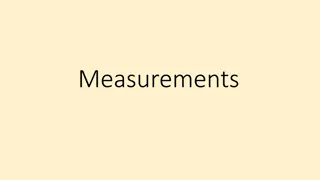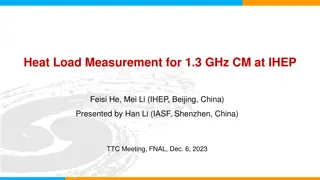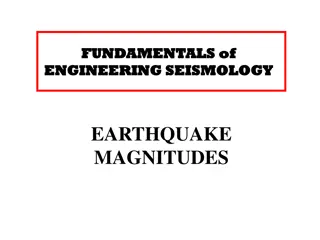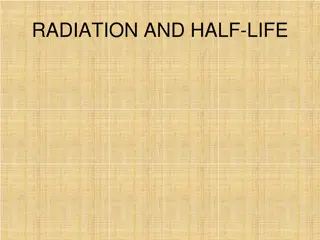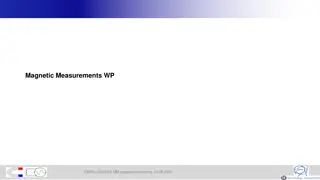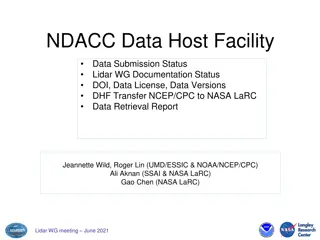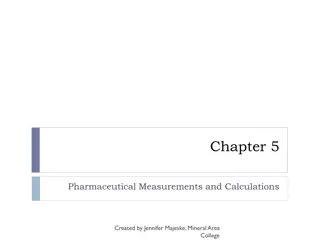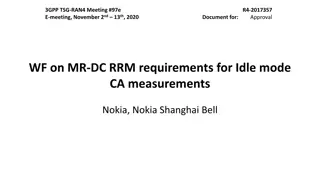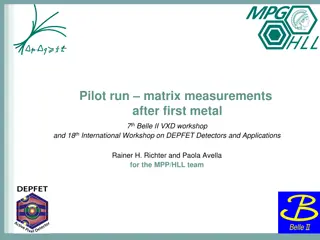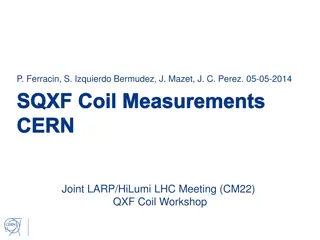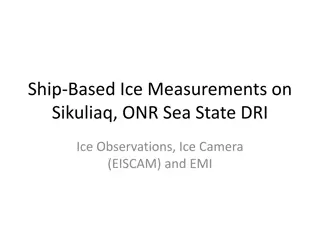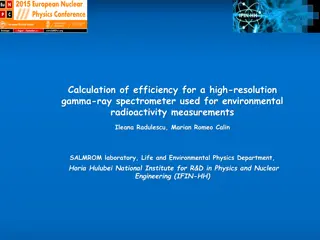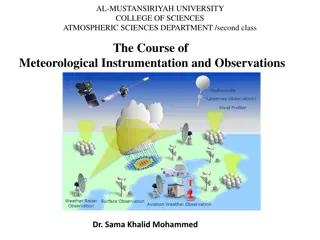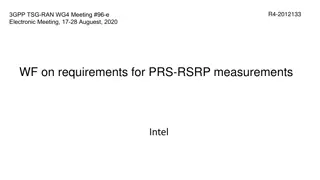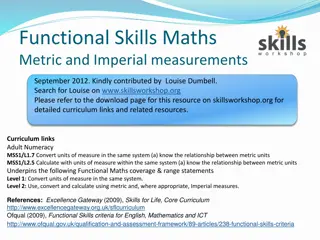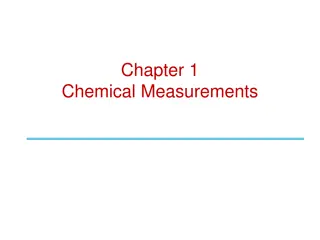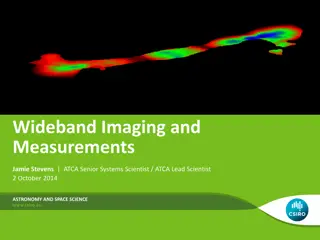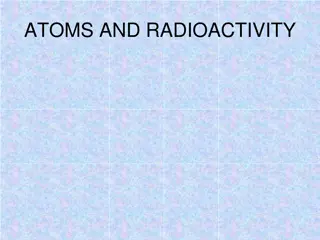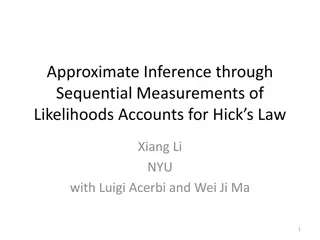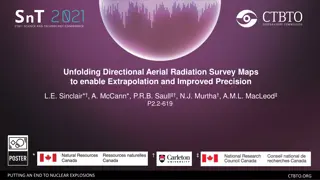Physics 2BL Laboratory: Measurements, Error Analysis & Data Interpretation
This Physics 2BL laboratory course focuses on measurements of physical quantities, error analysis, and interpretation of data. Students learn how scientists create models of natural phenomena and the practical aspects of conducting scientific experiments. Pre-requisites include Physics 2A, 4A or equ
0 views • 31 slides
Understanding Radioactivity and Nuclear Reactions
Exploring the nature of matter, this chapter delves into radioactivity and nuclear reactions. It covers the composition of atoms, the nucleus with protons and neutrons, and the role of electrons. The strong force holding protons and neutrons together is highlighted, along with the detection of radio
1 views • 126 slides
IGCSE Physics Practice Questions: Forces and Motion, Radioactivity, Terminal Velocity
Practice answering IGCSE Physics longer answer questions on topics like forces and motion, radioactivity, and terminal velocity. Develop your understanding by reviewing model answers and marking points. Enhance your exam skills and knowledge with detailed explanations and examples.
0 views • 8 slides
Understanding Radioactivity and its Particles in Radiochemistry
Radioactivity involves the spontaneous decay of unstable atomic nuclei, releasing radiation in the form of alpha particles, beta particles, and gamma rays. Alpha particles are heavy and have low penetration, beta particles are light and faster, while gamma rays are high-energy waves with great penet
1 views • 20 slides
Understanding Instrumentation and Process Control
This content discusses the importance of measurements in instrumentation and process control, outlining qualities of measurements, the main objectives of process instrumentation, applications of measurement systems, direct and indirect measurements, and functions of instruments such as transmitting,
1 views • 15 slides
Understanding Radioactivity: A Comprehensive Overview
Radioactivity is the spontaneous decay of unstable atomic nuclei, emitting alpha, beta, or gamma rays. This phenomenon is regulated by Massachusetts laws, with institutions like Clark University licensed for responsible use. Alpha decay involves emission of helium nuclei, while beta decay releases e
0 views • 39 slides
Understanding Radioactivity in Modern Physics
Radioactivity is the spontaneous emission of radiation by unstable atomic nuclei, seeking a more stable configuration. It can be measured using the becquerel as the SI unit, with factors determining nuclear stability being neutron/proton ratio and number of nucleons. The Law of Radioactive Decay exp
0 views • 18 slides
Understanding Radiation and Radioactivity in Science
Radiation is energy in transit, while radioactivity is the emission of ionizing radiation by materials. This process involves ionization, which removes electrons from atoms, leading to various nuclear decay processes such as alpha decay, beta decay, gamma-ray emission, positron decay, electron captu
0 views • 80 slides
Understanding Radioactivity and Nuclear Radiation
Radioactivity is the process in which unstable nuclei emit radiation, such as alpha, beta, or gamma particles, to become stable. This emission can change the element's identity and is crucial in fields like nuclear power and understanding Earth's core heat source. Different radioactive isotopes like
0 views • 12 slides
Cardiac MR Measurements Guide
This guide provides detailed instructions and images on how to measure various parameters in cardiac MR imaging, including left ventricle measurements in diastole and systole, LA measurements, aorta measurements, and EF calculations using CVI42 software. It also includes steps for phase calculations
0 views • 8 slides
Understanding Nuclear Physics and Radiation Hazards
Exploring the world of nuclear physics, this content covers topics like nuclear reactions, radioactivity, biological effects of nuclear radiation, and hazards of radiation exposure. It delves into the structure of the nucleus, radioactivity processes, nuclear energy, and the biological impacts of io
0 views • 30 slides
Estimation of Ionospheric Critical Plasma Frequencies Using GNSS Measurements
This research focuses on estimating the critical plasma frequency of the ionosphere, specifically the F2 layer (f0F2), using GNSS measurements. The study reviews past work on ionospheric modeling, discusses neural network training inputs, and presents a single station neural network model (NNT2F2).
0 views • 26 slides
Definition and Measurement Periods for RSTD in 3GPP TSG-RAN WG4 Meeting
In this document from the 3GPP TSG-RAN WG4 Meeting, the definition of intra/inter-frequency measurements, scenarios for RAN4 requirements, and measurement periods for RSTD are discussed. The focus is on requirements for RSTD and UE Rx-Tx time difference measurements. Various options and factors are
0 views • 19 slides
Importance of Measurements in Society
Measurements play a crucial role in society's proper functioning, involving units like ounces, pounds, inches, and cups for accuracy. Customary and metric systems are compared for distance, area, volume, weight, and temperature. Measuring equipment like liquid measuring cups ensures precise measurem
0 views • 24 slides
Neutrino Interactions with Liquid Argon at DUNE Near Detector Complex
The Deep Underground Neutrino Experiment (DUNE) aims to study neutrino oscillations using high-precision measurements with detectors like the Near Detector complex located downstream of the neutrino beam. Components such as ND-LAr and SAND play crucial roles in scanning energy spectra. SAND, a perma
0 views • 16 slides
Understanding the Importance of Soil and Groundwater Measurements
Explore the significance of infiltration and hydraulic conductivity measurements in environmental studies, training sessions offered by Eijkelkamp Training & Consultancy, and various reasons for conducting measurements such as defining drain distance, disconnecting rainwater, soil and groundwater po
0 views • 55 slides
Importance of Measurements in Society
Measurements play a crucial role in society's functioning, from customary systems to the metric system, ensuring accuracy in areas like distance, weight, volume, and temperature. Learn about essential terminologies, tools like liquid measuring cups, and the significance of accurate measurements for
0 views • 24 slides
Safely Logging Password-Derived Measurements for Web Login Systems
Design a secure measurement framework called Gossamer to assess risks associated with password-based measurements for web login systems. Explore ways to differentiate between benign and malicious traffic, and consider adding instrumentation to enhance security. Learn how attackers exploit password-d
0 views • 12 slides
Understanding Laboratory Measurements: Types, Units, and Symbols
Different types of measurements such as mass, time, volume, and length can be made in the laboratory using the metric or English system. Learn about the units, symbols, and instruments associated with these measurements for length, mass, volume, temperature, time, heat, and pressure. Explore how to
0 views • 15 slides
Fundamentals of Physical Measurements
Science and engineering rely on measurements to understand natural phenomena. Physics aims to predict future outcomes based on observed data and fundamental laws. Base physical quantities like length, time, and mass have standard units, forming the foundation for deriving other physical quantities.
0 views • 13 slides
Cryogenic Heat Load Measurement and Calibration at IHEP
Researchers at IHEP in Beijing, China, conducted heat load measurements for a 1.3 GHz Cryomodule, analyzing uncertainties in flow rate readings and calibrating mass flow rates. The study involved static and dynamic heat load measurements, utilizing various control interfaces and valves. Calibrations
0 views • 9 slides
Understanding Earthquake Magnitudes and Seismic Measurements
Delve into the fundamentals of engineering seismology and earthquake magnitudes, exploring topics such as fault dimensions, slip distribution, spectral shapes, Richter's observations, and logarithmic scales. Gain insights into how seismic measurements are characterized and understand the significanc
0 views • 69 slides
Understanding Radioactivity and Half-Life
Explore the principles of radioactivity, detection methods, radiation badges, Geiger tubes, activity measurement, and calculations related to radioactive decay and half-life. Learn how to detect radioactivity, interpret radiation exposure, and calculate average activity in becquerels using simple fo
0 views • 36 slides
Magnetic Measurements and Dipoles: Preparation Meeting Overview
In the preparation meeting for Magnetic Measurements at CERN, GSI, and CEA, various aspects of dipoles and measurement systems were discussed. Topics included instrument configuration, cycling requirements, accuracy considerations, and practical aspects such as reproducibility. The meeting outlined
0 views • 18 slides
ESA Validation Approach & Fiducial Reference Measurements Overview
The validation approach outlined by ESA focuses on providing reliable products with documented error bars and enhancing algorithm and sensor quality. A validation program consists of various activities, including validation against precise reference measurements, in-situ validation, inter-satellite
0 views • 8 slides
Lidar Working Group Data Submission Status - Continuing Measurements Report
The Lidar Working Group conducted a data submission status report on continuing measurements, including information on various sites, principal investigators, last archive comments, and data update statuses. The report covers a range of locations and parameters, highlighting the status of measuremen
0 views • 21 slides
Pharmaceutical Measurements and Calculations in Pharmacy
Understanding pharmaceutical measurements and calculations is crucial for pharmacy technicians to prevent calculation mistakes with serious consequences. This article covers the systems of measurement used in pharmacy, including the Metric System, basic math fundamentals necessary for pharmacy work,
0 views • 40 slides
3GPP TSG-RAN4 Meeting #97e Summary
During the 3GPP TSG-RAN4 Meeting #97e, discussions on Multi-RAT Dual Connectivity and Carrier Aggregation enhancements were held. A Work Item (WF) focusing on Idle mode Carrier Aggregation (CA) measurement Radio Resource Management (RRM) requirements was addressed. The meeting included topics such a
0 views • 17 slides
Matrix Measurements and Analysis After First Metal Workshop
The pilot run matrix measurements were conducted following the 7th Belle II VXD workshop and the 18th International Workshop on DEPFET Detectors and Applications by Rainer H. Richter and Paola Avella for the MPP/HLL team. The measurements included assessing defects, diode integrity, metal shorts, an
0 views • 30 slides
Coil Measurements and Monitoring at CERN: Insights and Procedures
This document provides detailed information about the coil measurements and monitoring process conducted at CERN, focusing on the SQXF coil. It includes data on coil winding, mandrel angles, edge locations, accumulated errors, and packing after curing. The text also discusses electrical quality assu
0 views • 9 slides
Comprehensive Ship-Based Ice Measurements and Observations on Sikuliaq for Sea State DRI
This collection of images showcases various ship-based ice measurements and observations conducted on the research vessel Sikuliaq for Sea State DRI. The images include aspects such as sea ice observations, snow and ice thickness measurements, evaluation of orthorectification, and new snow and ice i
0 views • 8 slides
Efficiency Calculation of High-Resolution Gamma-Ray Spectrometer for Environmental Radioactivity Measurements
SALMROM laboratory at IFIN-HH conducts environmental radioactivity monitoring using high-resolution gamma-ray spectrometry. The system includes a Coaxial p-type HPGe detector with reliable traceability. Activities involve evaluating radon concentrations in various environments and assessing radionuc
0 views • 13 slides
Radiosonde Technology and Upper Atmosphere Measurements in Meteorology
Upper atmosphere measurements above the surface are crucial for forecasting and research in meteorology. Radiosondes, carried by balloons, provide data on pressure, temperature, humidity, wind speed, and direction. These measurements are vital for analyses and research, especially in emergency situa
0 views • 19 slides
Requirements for PRS RSRP Measurements in 3GPP TSG-RAN-WG4 Meeting #96-e
The presentation discusses the measurement requirements for Position Reference Signal Received Signal Strength Indicator (PRS RSRP) in 3GPP TSG-RAN-WG4 Meeting #96-e, focusing on measurement periods, capabilities, side conditions for Downlink Angle of Departure (DL-AoD), and accuracy requirements fo
0 views • 6 slides
Understanding Metric and Imperial Measurements in Maths
Explore the world of metric and imperial measurements in mathematics, covering units for length, mass, and capacity. Learn conversion rates and relationships between different units, enhancing your functional maths skills at levels 1 and 2. Discover the significance of milli-, centi-, and kilo- pref
0 views • 11 slides
Chemical Measurements Overview
In Chapter 1 - Chemical Measurements, you will delve into SI Units, derived SI units, prefixes, unit conversions, concentrations like molarity and molality, and percent compositions. Explore how to use prefixes for calculations, convert units, and understand different concentration measurements for
0 views • 22 slides
Wideband Imaging and Measurements in Astronomy
Wideband imaging and measurements play a crucial role in astronomy and space science. This involves utilizing wide bandwidths to make accurate measurements and create images for continuum mapping and spectral-line observations. Increasing bandwidth enables lower thermal noise levels, quicker identif
0 views • 32 slides
Understanding Atomic Structure and Radioactivity
Explore the composition of atoms with protons, neutrons, and electrons, and learn about isotopes, nuclear notation, and the properties of subatomic particles. Understand radioactivity, including alpha, beta, and gamma radiation, and their impact on atomic and mass numbers. Discover the significance
0 views • 30 slides
Sequential Approximate Inference with Limited Resolution Measurements
Delve into the world of sequential approximate inference through sequential measurements of likelihoods, accounting for Hick's Law. Explore optimal inference strategies implemented by Bayes rule and tackle the challenges of limited resolution measurements. Discover the central question of refining a
0 views • 29 slides
Unfolding Directional Aerial Radiation Survey Maps for Improved Precision
Researchers present a novel method to unfold mobile radiation survey measurements, enhancing spatial precision and extrapolation validity. The approach provides insights on radioactivity distribution, crucial for on-site nuclear inspections under the CTBT. The use of direction-capable gamma detector
0 views • 16 slides
